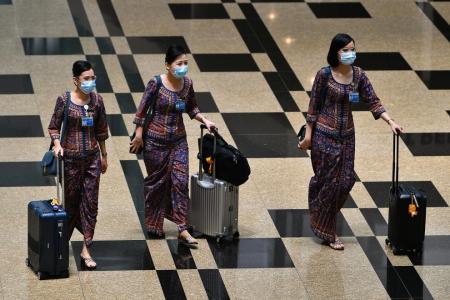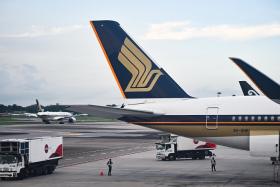SIA to retain cabin crew after they give birth, in change to longstanding practice
Singapore Airlines air stewardesses are now able to apply for temporary ground positions when they get pregnant and return to flying after giving birth.
The move stops its longstanding practice of effectively ending cabin crew members' contracts when they are pregnant.
An SIA circular seen by The Straits Times showed that the new policy has been in place since July 15, which it said is meant "to further support our cabin crew during and after their pregnancy".
It spells the end of a practice that has been criticised by women's groups as unjustifiable even a decade ago.
Observers said a global manpower shortage in the sector is likely the rationale for the change, as companies are forced to retain existing staff to reduce the load on training new recruits.
Before the change, SIA air stewardesses were placed on no-pay leave upon declaring that they were pregnant, and forced to leave the company the day after they submit their child's birth certificate.
No temporary ground job placements were made available while the crew member was pregnant. To fly again later, she had to reapply to SIA under a returning crew scheme, which does not guarantee her re-employment.
Now, crew members will still be placed on no-pay leave, but will be able to apply for ground positions in the company, in areas such as administrative work, handling of passenger feedback and requests via e-mail, content creation and event management.
SIA in its circular said the company will do its best to offer as many of these jobs as possible to maintain the cabin crew member's income, and told ST that those who have applied have so far been able to find jobs without issues.
It said some expecting crew members have already taken up ground positions.
More importantly, crew members will be placed on up to 16 weeks of maternity leave after they have given birth before automatically being rostered to fly again.
If the crew member's contract expires during her pregnancy, she will be offered a one-year contract renewal, SIA said.
Women's groups said SIA's policy shift is an important move that finally brings Singapore's national carrier in line with other airlines.
Association of Women for Action and Research (Aware) executive director Corinna Lim said this is a major improvement to SIA's previous policy. In 2010, Aware called SIA's practice "discriminatory and unfair".
"If the basis is solely to protect female attendants or foetuses, can this not be achieved in a fairer way by providing alternative employment for female attendants during pregnancy and allowing them to fly again after their pregnancy?" it had asked.
Ms Lim said: "It is not acceptable for contracts to require employees to resign when they are pregnant, especially since under Singapore law, it is illegal to fire women because of pregnancy."
She said there are grey areas that SIA has not addressed. "Are there other rules, explicit or implicit, that will bar post-partum mothers from flying for SIA, such as requirement on physique? Losing baby weight takes time, usually six to 12 months."
When asked, SIA only said: "We maintain the same grooming standards for all cabin crew."
Ms Sher-li Torrey, founder of enterprise Mums@Work, said airlines like Scoot and Delta Airlines have hired returning mothers, proving that they can perform the physical requirements of a cabin crew member's job.
The new policy is one in the right direction, she said.
She added: "Potentially what might be even better would be to allow crew to take on ground roles till they truly want to return to flying even after pregnancy."
Ms Torrey said new mothers might prefer short-haul flights so that they can spend more time with their babies and breastfeed them, if it does not affect their pay.
Former SIA stewardess Clara Fu, 35, said she wishes this policy were in place 12 years ago, when her contract was terminated after she gave birth to her first child.
She was then a few months short of getting her five-year gratuity payout of $15,000, which she had to forfeit despite an appeal.
After successfully applying to fly again through the returning crew scheme in 2011, she was then forced to stop working once more in 2012 when she was pregnant with her second child.
"I was the sole breadwinner of the family then as my ex-husband was pursuing his studies. We needed the money so I hid the pregnancy for as long as possible to keep working," said Ms Fu, who now works in the healthcare industry.
Welcoming SIA's change, she said: "SIA is a national carrier. It should support young families."
Get The New Paper on your phone with the free TNP app. Download from the Apple App Store or Google Play Store now


